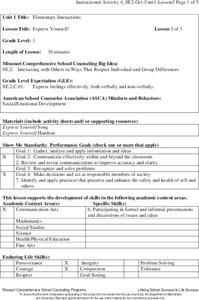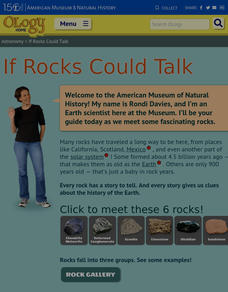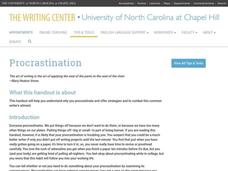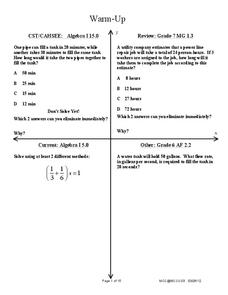University of North Carolina
Latin Terms and Abbreviations
N.B.. cit., n.b., viz., sc., inf. e,g,—these abbreviations frequently appear in academic papers and on works cited lists, but what do they mean? Part of a larger series to improve writing skills, the handout on Latin terms and...
NASA
Applying Newton’s Laws
Newton's Laws get the rocket to work, but do they serve any other functions? A six-page resource classifies rockets by the type of propellant they use. It then describes applications of Newton's Laws of Motion, both in the ability to...
Macmillan Education
Cultural Awareness
The importance of cultural awareness, of becoming aware of our own and other cultures, and the benefits of gaining a deeper understanding of the differences between cultures, is the focus of this resource. Working individually, in pairs,...
Chicago Botanic Garden
Weather or Not
What is the difference between weather and climate? This is the focus question of a lesson that takes a deeper look at how weather data helps determine climate in a region. Using weather and climate cards, students decide if a statement...
Missouri Department of Elementary
My Problem…Your Problem…Our Problem
Encourage sixth graders to take responsibility for their actions and become a problem solver. Pupils discuss new problems faced in sixth grade then identify ones that involve other people. A worksheet guides their practice in conflict...
Missouri Department of Elementary
Express Yourself!
Encourage scholars to express themselves with help from an engaging song. Sung to the tune of "London Bridge is Falling Down," participants sing phrases that offer tips for dealing with emotions—sad, happy, worried, proud, mad, and...
American Museum of Natural History
If Rocks Could Talk
Meet some interesting rocks. Learners discover information about the three types of rocks and different rocks that are within each group. They read imaginary interviews with six rocks as each rock tells the story of their formation and a...
CK-12 Foundation
Radical Equations: Geometric Visual of a Square Root
How can you draw a number? A set of questions takes learners through the reasoning for why a geometric construction can be drawn to represent the square root of a number. An interactive helps visualize the construction.
CK-12 Foundation
Law of Cosines: Get on Base
Baseball is all about math. Young baseball and mathematics enthusiasts determine the distance between players on a baseball field using the Law of Cosines. An interactive helps them find relevant distances and angles to use in their...
University of North Carolina
Procrastination
Inevitably, whenever you give an assignment, at least one person won't start until the last minute. As the 13th handout in the 24-part Writing the Paper series explains, procrastination sometimes brings consequences. It breaks down...
Annenberg Foundation
Native Voices
The Navajo people build their dwellings with the doors facing the rising sun in the east to welcome wealth and fortune. Pupils learn about the traditions of the Navajo people in the first part of a 16-part unit. They explore American...
PBS
Who Knows Best
Finding an expert in a given field when conducting research can be a challenge. This guide provides step-by-step directions as well as links to resources that help young sleuths find the authorities and experts they need. As a bonus, two...
NOAA
Seafood and Human Health
Whether your young biologists realize it or not, humans play a significant role in marine ecosystems. To help them understand this fact children first create graphical representations that show homo sapiens' place in marine food chains,...
EngageNY
End of Unit Assessment Part II: Science Talk
Scholars complete Part 2 of their end of unit assessment by having a science talk. Pupils pair up to answer questions about what makes a natural disaster. As one learner talks, the other records what is said. They then trade places.
Illustrative Mathematics
Mile High
What is the meaning of sea level? This resource helps your class understand the meaning of elevations above, below, and at sea level. Provides for good discussion on using positive and negative numbers to represent quantities in the real...
PBS
Team Work and Planning
Welcome to the Great Marshmallow Challenge. To conclude a unit study designed to help scholars develop teamwork and collaboration skills, groups are charged with developing a free-standing structure using only one marshmallow, 20 pieces...
Laboratory for Atmospheric and Space Physics
Jupiter’s Relative Size
How do you properly illustrate the extreme size difference between two planets—Earth and Jupiter? With the help of jellybeans, of course! Create a scale model of Jupiter's mass compared to Earth using a fishbowl, 1,400 beans, and a dixie...
West Contra Costa Unified School District
Work Problems – Bar Models
Why do we have to do so much work? Scholars learn how to set up bar models to represent a situation involving work. They use these bar models to help set up equations with rational coefficients to solve the problem situation.
Curated OER
Beginning Daily Activities Unit
Begin each day with a warm-up that has ELLs focusing their minds on a skill that will be taught that day. Focusing on verbs, each daily lesson reinforces study and self-management skills, helps learners become proficient in working with...
University of Colorado
Phases of Charon
Pluto, although no longer considered a planet, has five moons. Pluto's moon, Charon, is the focus of a resource that describes how the moon is viewed from the surface of Pluto. Photos help individuals see how Charon would look at...
The Alamo
A Teacher’s Guide to Sam Houston
Need a teacher's guide all about Sam Houston and how he relates to the Texas Revolution? Look no further! The guide includes a timeline detailing Houston's life, important milestones, and relevant maps that include his movement around...
Biology Junction
Macromolecules
In chemistry, organic means something contains a carbon base. A helpful presentation starts by defining macromolecules as large organic carbon molecules. Scholars answer questions about each topic on the associated worksheet. It covers...
EngageNY
Setting Purpose for Research: What are Fair Working Conditions?
Life may not be fair but working conditions should be. Scholars research working conditions at Wegmans by studying the company website. They complete a working conditions anchor chart and discuss their findings in a think-pair-share...
EngageNY
Performance Task Preparation: Peer Critique and Mini-Lesson Addressing Common Errors: Revising Draft Essay to Inform
Time to revise! Using a writing evaluation rubric, scholars participate in a peer editing process to provide feedback on each others' informative essays. Next, pupils begin revising their drafts based on the feedback they receive.
Other popular searches
- Skit on Helping Others
- Writing About Helping Others
- Helping Others Essay
- Helping Others and Sickness
- Essays Helping Others
- Helping Others Lesson Plan
- "Helping Others" Social
- Helping Others Appropriately
- Helping Others Raising Money
- Witing About Helping Others
- Waiting About Helping Others

























